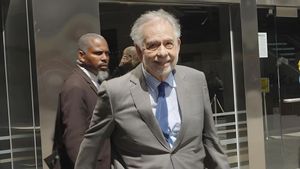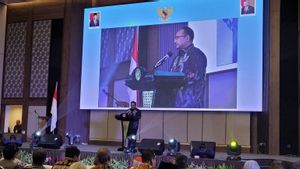
JAKARTA - On Wednesday, December 27, The New York Times sued OpenAI and Microsoft. The media company accused the two of using millions of newspaper articles without permission to train chatbots to provide information to readers.
The Times stated that this was the first legal action by a major media organization in the United States suing OpenAI, creator of the popular artificial intelligence platform ChatGPT, and Microsoft, an OpenAI investor and creator of an artificial intelligence platform now known as Copilot, over the issue of copyright from his work.
The lawsuit, filed in Manhattan federal court, accused OpenAI and Microsoft of trying to "profit The Times' big investment in its journalism" by using its content to provide alternative ways of conveying information to readers.
"No one is 'transformed' in using The Times content without payment to make a product that replaces The Times and steals an audience from it," The Times said.
OpenAI and Microsoft argue that using copyright-protected works to train artificial intelligence products is "a reasonable use," a legal doctrine governing the unlicensed use of copyright-protected material.
The Times did not mention a certain amount of loss, but estimated a loss in "billions of dollars." They also want OpenAI and Microsoft to destroy chatbot models and training sets that include their material.
Conversations to avoid lawsuits and allow "profit-to-profit exchanges" with defendants were unsuccessful, the 172-year-old newspaper said.
"We respect the rights of creators and content owners," OpenAI said in a written statement. "Our ongoing conversation with the New York Times has been running productively and moving forward constructively, so we are shocked and disappointed by this development."
Meanwhile, Microsoft did not provide a response to requests for comment.
Artificial intelligence companies use online information to train AI-generative chatbots, and have withdrawn billions of dollars in investment. Investors have even assessed OpenAI for more than 80 billion US dollars (Rp1,235.5 trillion).
Although OpenAI's parent company is a non-profit organization, Microsoft has invested $13 billion in a profit-oriented subsidiary, to gain 49% stake.
Writers such as David Baldacci, Jonathan Franzen, John Grisham, and Scott Turow have also sued OpenAI and Microsoft in Manhattan federal courts. They claim that artificial intelligence systems may have taken over tens of thousands of their books.
In July, comedian Sarah Silverman and another author sued OpenAI and Meta Platforms in San Francisco for "reigning" their work, including the 2010 Silverman book "The Bedwetter." Most of the cases were rejected by the judge in November.
The Times filed the lawsuit seven years after the US Supreme Court refused to revive a challenge to Google's digital library containing millions of books.
A federal appeals court concluded that the library, which grants reader access to text snippets, is considered a reasonable use of authors' works.
"OpenAI provides a second chance for the copyright industry," said Yah Desai, a professor of business and ethical law at the Georgia Institute of Technology.
"The resulting results are important," said Desai. "The part of the problem in assessing OpenAI's legal responsibility is that the company has changed its products in line with the emergence of copyright issues. A court can say the results at this time are sufficient to find legal responsibility."
Chatbots have exacerbated the struggle of major media organizations in attracting and defending readers, although The Times has been more successful than most other media.
The Times ended September with 9.41 million digital-only subscribers, up from 8.59 million the previous year, while print subscribers fell to 670,000 from 740,000.
관련 항목:
The subscription generates more than two-thirds of The Times' revenue, while advertising generates about 20% of revenue.
The Times lawsuit records several examples where OpenAI and Microsoft chatbots gave users a nearly verbatic quote from the article.
This includes a 2019 Pulitzer-winning series on malicious lending in the New York City taxi industry, and a restaurant critical review by Pete Wells in 2012 about Guy Fieri which went viral.
The Times says such abuses threaten high-quality journalism by reducing readers' needs to visit its website, reduce traffic, and potentially cut revenue from advertising and subscriptions.
They also said the defendant's chatbot made it more difficult for readers to distinguish fact from fiction, including when their technology incorrectly distributed information to newspapers.
The Times said ChatGPT had mistakenly contributed two office seat recommendations to its Wirecutter product review website.
"In artificial intelligence language, it's called 'halusination,'" The Times said. "In simple English, this is misinformation."
Diane Brayton, The Times' legal adviser, told staff in an internal memo that the newspaper recognizes the potential for generating artificial intelligence for journalism, but "the use of our work to make Genai tools must be accompanied by permission and agreements that reflect the fair value of the work, as regulated by law."
The English, Chinese, Japanese, Arabic, and French versions are automatically generated by the AI. So there may still be inaccuracies in translating, please always see Indonesian as our main language. (system supported by DigitalSiber.id)

















